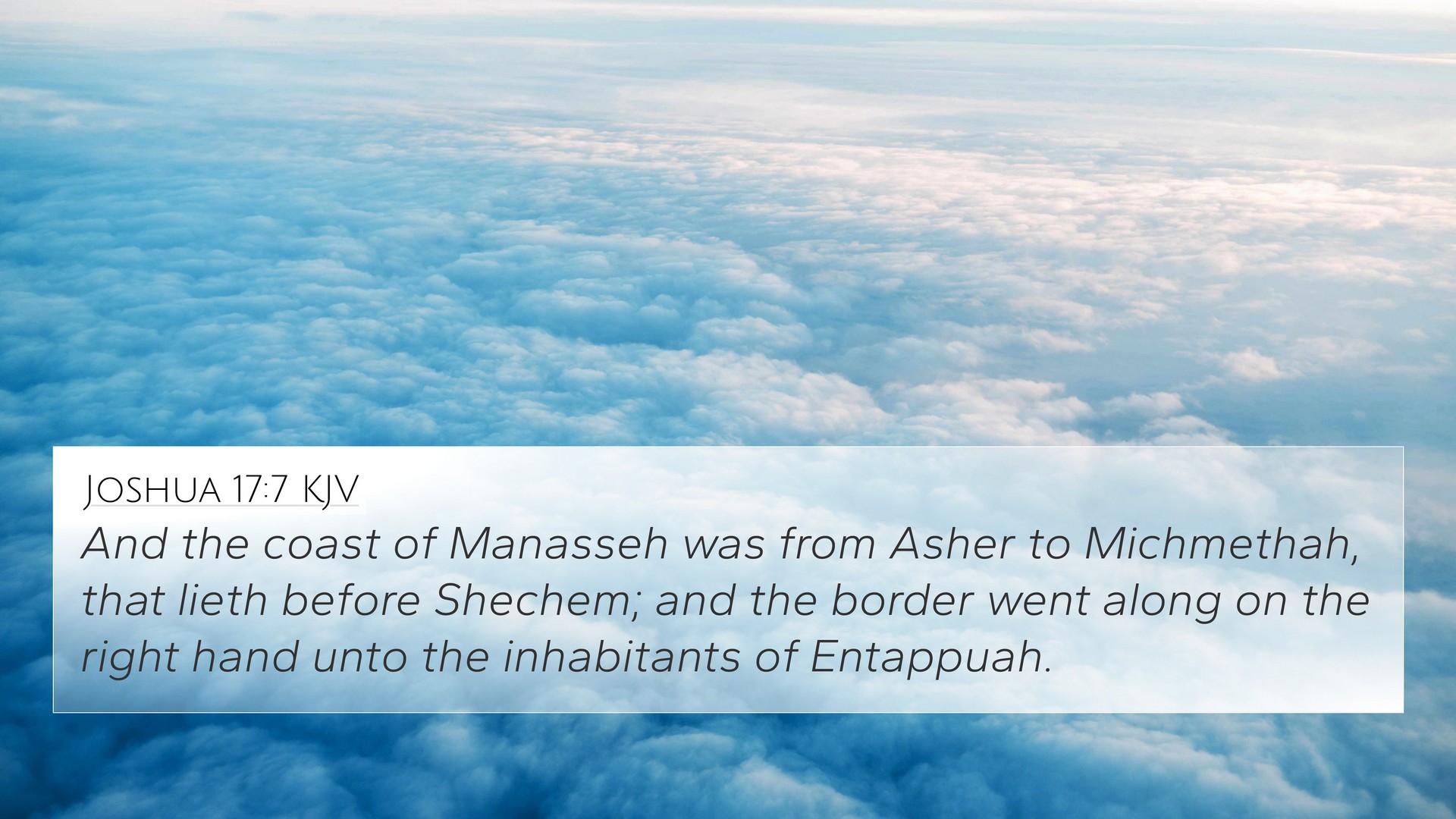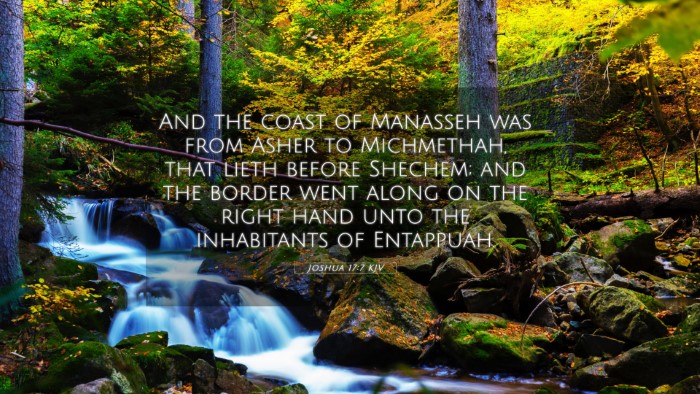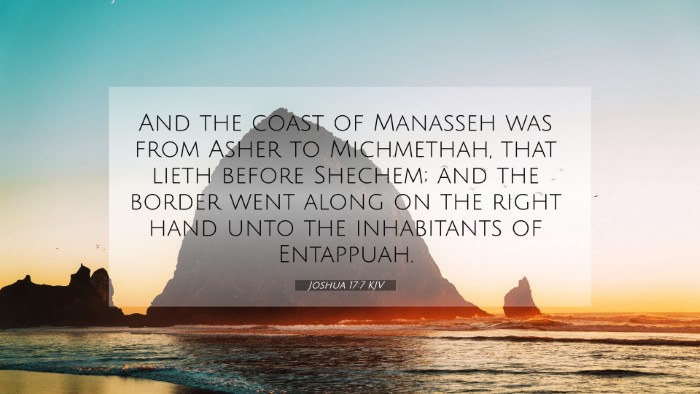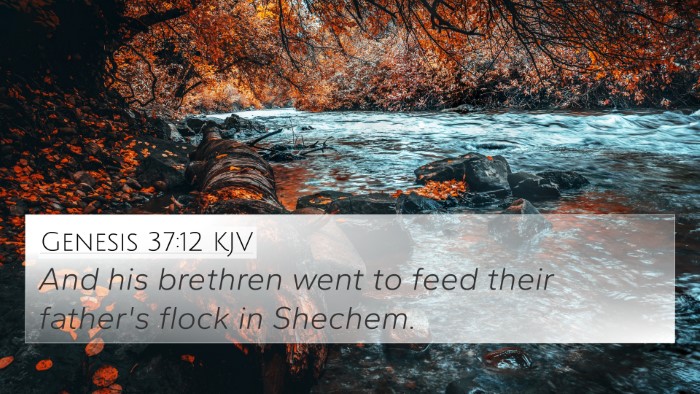Old Testament
Genesis Exodus Leviticus Numbers Deuteronomy Joshua Judges Ruth 1 Samuel 2 Samuel 1 Kings 2 Kings 1 Chronicles 2 Chronicles Ezra Nehemiah Esther Job Psalms Proverbs Ecclesiastes Song of Solomon Isaiah Jeremiah Lamentations Ezekiel Daniel Hosea Joel Amos Obadiah Jonah Micah Nahum Habakkuk Zephaniah Haggai Zechariah MalachiJoshua 17:7 Similar Verses
Joshua 17:7 Cross References
And the coast of Manasseh was from Asher to Michmethah, that lieth before Shechem; and the border went along on the right hand unto the inhabitants of Entappuah.
Uncover the Rich Themes and Topics of This Bible Verse
Listed below are the Bible themes associated with Joshua 17:7. We invite you to explore each theme to gain deeper insights into the Scriptures.
Joshua 17:7 Cross Reference Verses
This section features a detailed cross-reference designed to enrich your understanding of the Scriptures. Below, you will find carefully selected verses that echo the themes and teachings related to Joshua 17:7 KJV. Click on any image to explore detailed analyses of related Bible verses and uncover deeper theological insights.
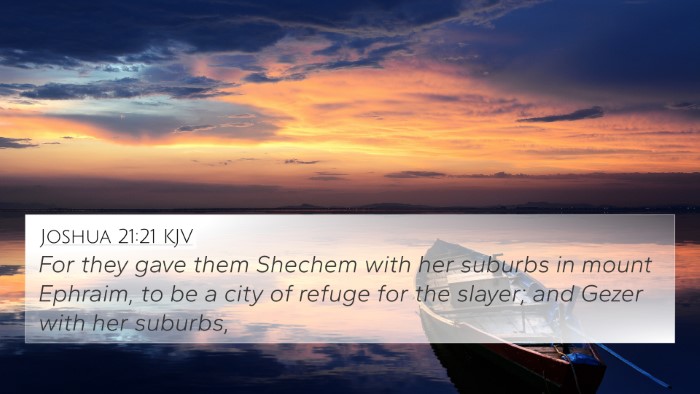
Joshua 21:21 (KJV) »
For they gave them Shechem with her suburbs in mount Ephraim, to be a city of refuge for the slayer; and Gezer with her suburbs,
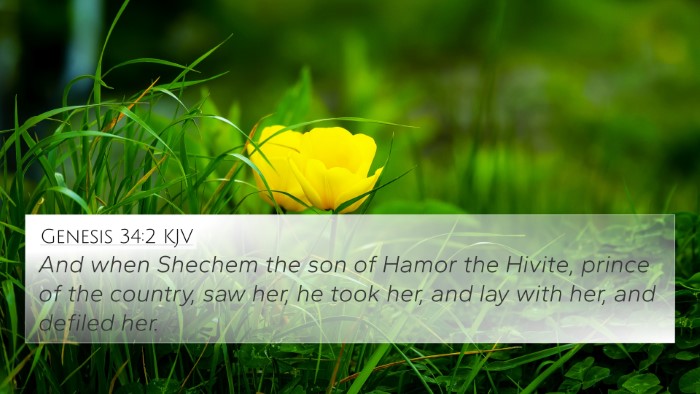
Genesis 34:2 (KJV) »
And when Shechem the son of Hamor the Hivite, prince of the country, saw her, he took her, and lay with her, and defiled her.
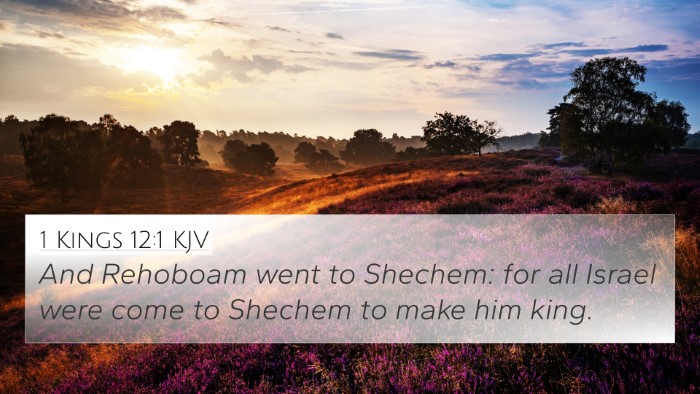
1 Kings 12:1 (KJV) »
And Rehoboam went to Shechem: for all Israel were come to Shechem to make him king.
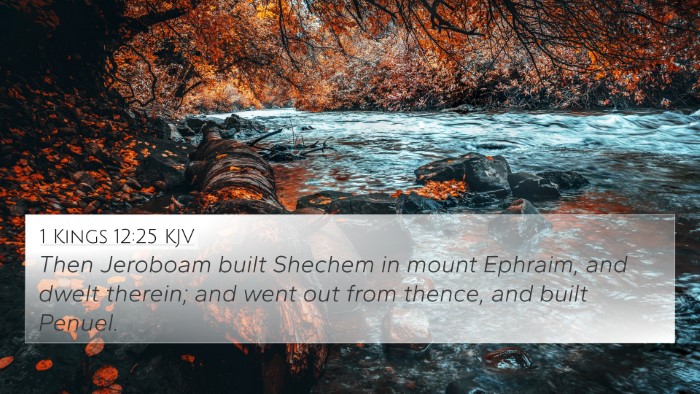
1 Kings 12:25 (KJV) »
Then Jeroboam built Shechem in mount Ephraim, and dwelt therein; and went out from thence, and built Penuel.
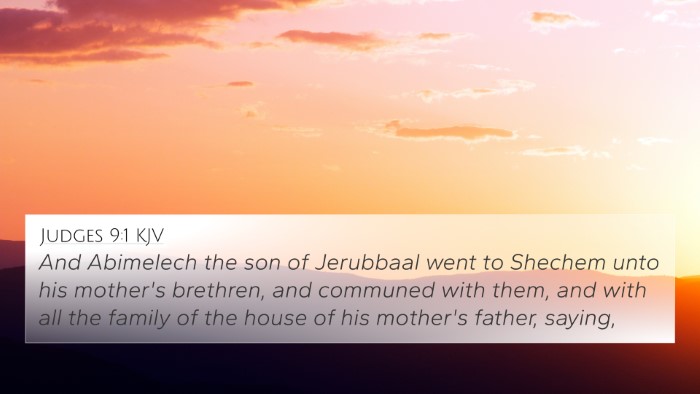
Judges 9:1 (KJV) »
And Abimelech the son of Jerubbaal went to Shechem unto his mother's brethren, and communed with them, and with all the family of the house of his mother's father, saying,
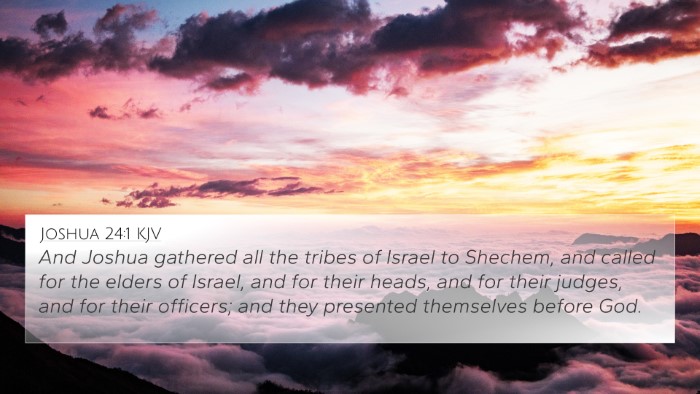
Joshua 24:1 (KJV) »
And Joshua gathered all the tribes of Israel to Shechem, and called for the elders of Israel, and for their heads, and for their judges, and for their officers; and they presented themselves before God.
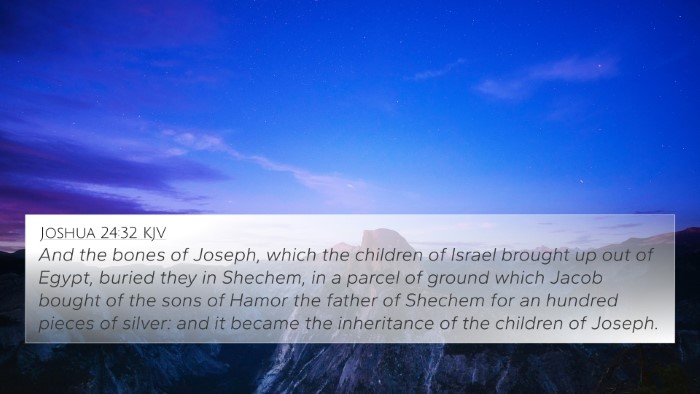
Joshua 24:32 (KJV) »
And the bones of Joseph, which the children of Israel brought up out of Egypt, buried they in Shechem, in a parcel of ground which Jacob bought of the sons of Hamor the father of Shechem for an hundred pieces of silver: and it became the inheritance of the children of Joseph.
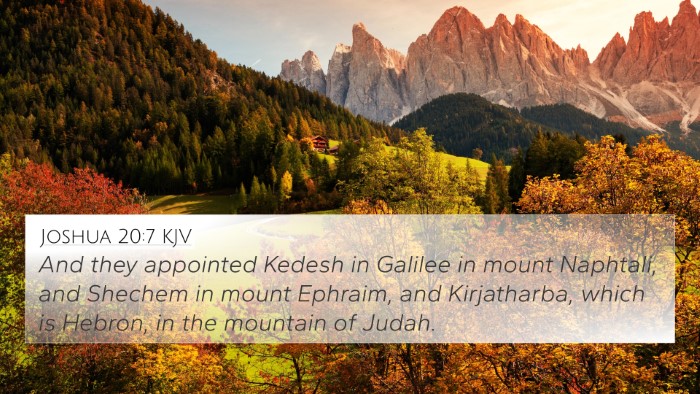
Joshua 20:7 (KJV) »
And they appointed Kedesh in Galilee in mount Naphtali, and Shechem in mount Ephraim, and Kirjatharba, which is Hebron, in the mountain of Judah.
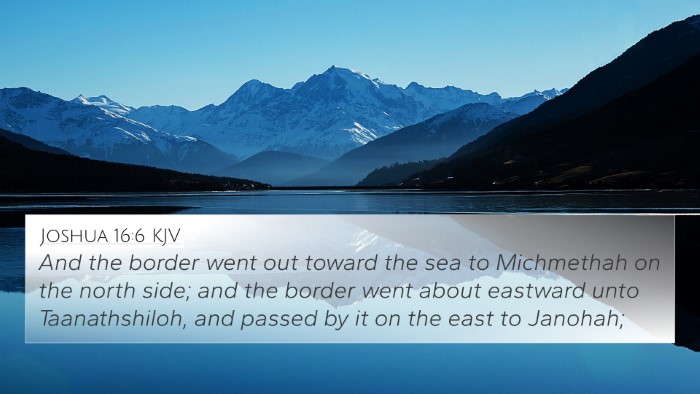
Joshua 16:6 (KJV) »
And the border went out toward the sea to Michmethah on the north side; and the border went about eastward unto Taanathshiloh, and passed by it on the east to Janohah;
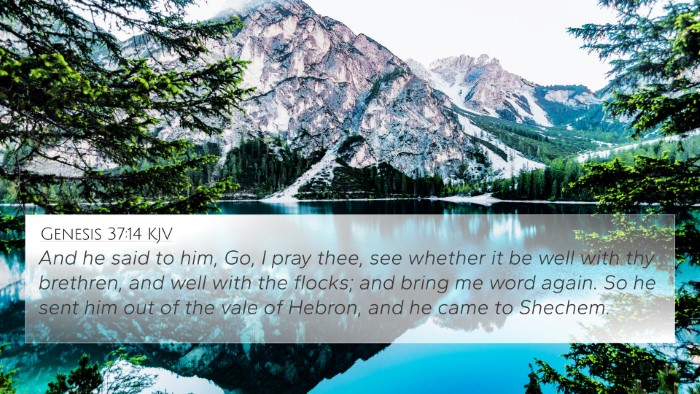
Genesis 37:14 (KJV) »
And he said to him, Go, I pray thee, see whether it be well with thy brethren, and well with the flocks; and bring me word again. So he sent him out of the vale of Hebron, and he came to Shechem.
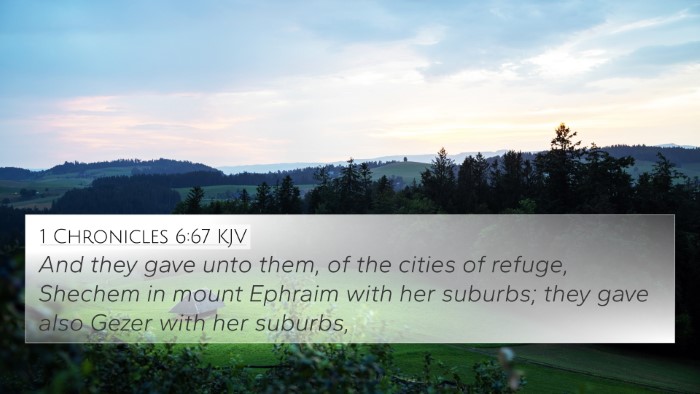
1 Chronicles 6:67 (KJV) »
And they gave unto them, of the cities of refuge, Shechem in mount Ephraim with her suburbs; they gave also Gezer with her suburbs,
Joshua 17:7 Verse Analysis and Similar Verses
Understanding Joshua 17:7
The verse Joshua 17:7 states, "And the border of Manasseh was from Asher to Michmethah, that lieth before Shechem; and the border went along on the right hand unto the inhabitants of Entappuah."
This verse addresses the territorial allotments given to the tribe of Manasseh, one of the sons of Joseph. In the context of the Book of Joshua, it emphasizes the organization of the Israelite tribes in the Promised Land. To fully appreciate its meaning, it is important to look at various commentaries that clarify its significance.
Commentary Insights
According to Matthew Henry, the details in this verse highlight God's faithfulness to His promise to give land to the tribes of Israel. The precise description of borders suggests that God is meticulous in His plans for His people. Henry emphasizes how the physical inheritance reflects spiritual truths about God’s provision and faithfulness.
Albert Barnes notes that the mention of specific locations serves to authenticate the historical and geographical context of Israel's settlement. He explains that these locations give the Israelites a sense of identity and belonging, reinforcing their new life in the land after years of wandering. The names also connect to earlier narratives in the Bible, linking this promise back to Joseph's family lineage.
Adam Clarke offers a perspective on the implications of the division of land. He highlights that the land distribution was not only practical for governance but also symbolic. It represented God’s blessing and the fulfillment of His covenant with Israel, emphasizing the importance of understanding one’s heritage and community in faith.
Cross References and Connections
Joshua 17:7 can be understood better by examining related verses that highlight the inheritance of land and God's promises. Here are some relevant cross-references:
- Genesis 48:5-6 - Joseph’s blessings to his sons, especially Ephraim and Manasseh.
- Joshua 13:29-31 - God’s command regarding the land allotted to the half-tribe of Manasseh.
- Joshua 1:6-8 - God's encouragement to Joshua regarding the distribution of the land.
- Numbers 34:14-15 - Details about the boundaries of the land for each tribe.
- Deuteronomy 3:13 - Reference to the allocation of land to the descendants of Manasseh.
- 1 Chronicles 5:23 - Insights into the settlements and warfare of the tribe of Manasseh.
- Matthew 1:10-11 - The genealogy of Jesus pointing back to the lineage of Manasseh through Joseph.
- Hebrews 11:9 - The faith of Abraham in moving towards a promised land that was later claimed by the Israelite tribes.
- Psalm 78:68-70 - God’s choice of Jacob and the tribe of Joseph, enhancing the understanding of Manasseh's inheritance.
- Revelation 7:6 - Mention of the tribe of Joseph, portraying the enduring significance of Manasseh in Biblical history.
Bible Cross-References and Their Importance
Understanding cross-references in the Bible allows for a deeper appreciation of how various scriptures relate to each other. Cross-referencing Biblical texts helps us to see the thematic connections and the unifying narrative of God's dealings with humanity.
Tools for Bible cross-referencing, such as a Bible concordance or a Bible cross-reference guide, can facilitate this process. For instance, by exploring cross-references, one can see connections between Old and New Testament writings, helping to identify themes of inheritance, promise, and fulfillment.
Practical Applications of Cross-References
When studying Bible verses like Joshua 17:7, identifying connections between these verses aids in teaching and sermon preparation. Here are a few methods to effectively use cross-references:
- How to find cross-references in the Bible: Use a systematic approach with a concordance or topical guide.
- Identifying connections between Old and New Testament: Look for typological parallels, where events in the Old Testament foreshadow New Testament truths.
- Comparative study of Pauline epistles: Analyze how Paul utilized Old Testament references to explain New Covenant theology.
- Cross-referencing Psalms with New Testament teachings: Explore how Jesus quoted Psalms, showing their fulfillment in His ministry.
- Interpreting Biblical themes through cross-references: Use cross-references to deepen theological understanding of God's overarching narrative.
Conclusion
Joshua 17:7 serves as a crucial piece of the narrative about Israel’s inheritance in the land, signifying God's promise and faithfulness to His people. Through a careful examination of cross-references and themes, readers can appreciate the complexity and depth of the Scriptures. By exploring various commentaries, the significance of this verse is illuminated, emphasizing the importance of understanding Biblical texts in their broader theological and historical context.
